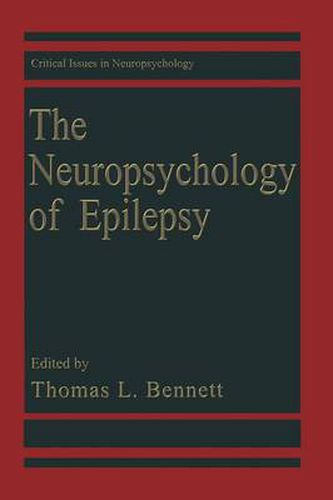Readings Newsletter
Become a Readings Member to make your shopping experience even easier.
Sign in or sign up for free!
You’re not far away from qualifying for FREE standard shipping within Australia
You’ve qualified for FREE standard shipping within Australia
The cart is loading…






This title is printed to order. This book may have been self-published. If so, we cannot guarantee the quality of the content. In the main most books will have gone through the editing process however some may not. We therefore suggest that you be aware of this before ordering this book. If in doubt check either the author or publisher’s details as we are unable to accept any returns unless they are faulty. Please contact us if you have any questions.
This was an exciting project to work on, and I attempted to obtain a broad sampling of current research on the neuropsychology of epilepsy. Because the emphasis of the book takes a neuropsychological perspective on epilepsy, the coverage is not redundant with previous texts on this topic. The book is organized around three themes, although individual chapters certainly often extend beyond the part in which they are located. The three major topics are the nature of epilepsy, cognitive and emotional consequences of epilepsy, and treatment approaches to epilepsy and outcome. In Part I, following a historical overview of epilepsy in Chapter 1 by Sandra D. Haynes and me, Gerald C. McIntosh presents a conceptualization of the epilepsies from a neurologist’s perspective. The characteristics of seizure types are discussed, and the etiology of secondary epilepsies is described. Epileptic syndromes are considered. McIntosh outlines clinical seizure patterns associated with seizures originating from different cortical regions.
$9.00 standard shipping within Australia
FREE standard shipping within Australia for orders over $100.00
Express & International shipping calculated at checkout
This title is printed to order. This book may have been self-published. If so, we cannot guarantee the quality of the content. In the main most books will have gone through the editing process however some may not. We therefore suggest that you be aware of this before ordering this book. If in doubt check either the author or publisher’s details as we are unable to accept any returns unless they are faulty. Please contact us if you have any questions.
This was an exciting project to work on, and I attempted to obtain a broad sampling of current research on the neuropsychology of epilepsy. Because the emphasis of the book takes a neuropsychological perspective on epilepsy, the coverage is not redundant with previous texts on this topic. The book is organized around three themes, although individual chapters certainly often extend beyond the part in which they are located. The three major topics are the nature of epilepsy, cognitive and emotional consequences of epilepsy, and treatment approaches to epilepsy and outcome. In Part I, following a historical overview of epilepsy in Chapter 1 by Sandra D. Haynes and me, Gerald C. McIntosh presents a conceptualization of the epilepsies from a neurologist’s perspective. The characteristics of seizure types are discussed, and the etiology of secondary epilepsies is described. Epileptic syndromes are considered. McIntosh outlines clinical seizure patterns associated with seizures originating from different cortical regions.